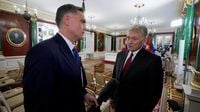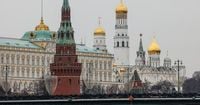As European leaders intensify their calls for a ceasefire in Ukraine, Kremlin spokesperson Dmitry Peskov has firmly stated that Russia remains "resistant to any kind of pressure" regarding a proposed 30-day truce. This declaration comes amid escalating diplomatic tensions following a collective push from Western nations, including the United States, for a halt in hostilities.
On May 10, 2025, Peskov, speaking to CNN's Frederik Pleitgen in Moscow, emphasized that Russia would not yield to external demands. "We hear many contradictory statements from Europe. They are generally confrontational in nature rather than aimed at trying to revive our relations. Nothing more," he stated. This remark underscores the Kremlin's perception of the West's approach as counterproductive to fostering dialogue.
European leaders, in a united front, have backed a U.S. initiative calling for an unconditional ceasefire to commence on May 12, 2025. British Prime Minister Keir Starmer highlighted the seriousness of the situation, stating, "So all of us here together with the U.S. are calling Putin out. If he is serious about peace, then he has a chance to show it." This coalition seeks to pressure President Vladimir Putin into compliance, framing the ceasefire as a vital step towards peace.
Despite this external pressure, Peskov reiterated that President Putin is open to discussions with any leader willing to engage. He noted, "President Putin has repeatedly said that he is ready for contacts with any leaders and is open to interaction, to dialogue with any leaders to the extent that the leaders themselves are ready." This statement reflects Russia's stance that the onus is on the West to facilitate negotiations.
However, the Kremlin's position is complicated by its claim of military superiority in the ongoing conflict. Peskov expressed concerns that a ceasefire could provide Ukraine with an opportunity to regroup and reinforce its military capabilities. He remarked, "Russia believes it has the advantage on the battlefield and is concerned that Ukraine could use a 30-day pause in the war to rest its forces, mobilise more men, and get hold of more Western arms." This highlights the Kremlin's strategic calculations as it weighs the risks of a temporary halt in fighting.
In the lead-up to the ceasefire discussions, Peskov had indicated that while Russia could support the ceasefire, it would require careful consideration of "a large number of nuances." He also pointed out that any Western military assistance to Ukraine would need to cease for a ceasefire to be feasible, suggesting that continued support for Kyiv would undermine the potential for peace.
As the diplomatic chess game unfolds, the international community watches closely. The U.S. has positioned itself as a key player in this initiative, with President Donald Trump endorsing the European leaders' call for a ceasefire. The backing from the U.S. is seen as a significant factor in the pressure being applied to Russia.
In a separate yet notable event on the same day, Pope Leo XIV made his first public appearance outside the Vatican, visiting a Catholic shrine east of Rome and paying respects at the tomb of his predecessor, Francis. This visit, while unrelated to the ongoing conflict, serves as a reminder of the broader spiritual and humanitarian dimensions that often accompany discussions of war and peace.
The Kremlin's response to the ceasefire proposal illustrates the complex interplay of military strategy, international diplomacy, and national pride. As the situation continues to evolve, the potential for dialogue remains tenuous, with both sides entrenched in their positions. The coming days will be crucial in determining whether a genuine path to peace can be forged or if the cycle of conflict will persist.
In conclusion, as European leaders and the U.S. push for a ceasefire, the Kremlin's reluctance to engage under pressure suggests that achieving a lasting peace will require not only diplomatic efforts but also a reevaluation of military strategies on both sides. The world watches as these developments unfold, hoping for a resolution that can end the suffering in Ukraine.



